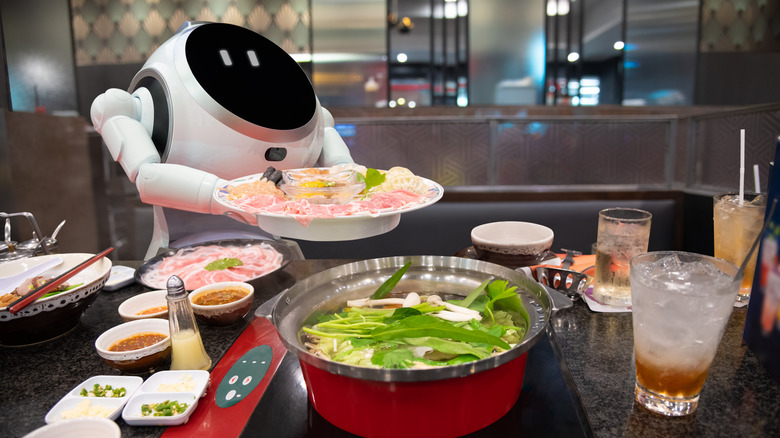Are Robots Taking Over Restaurant Cashier Jobs?
The idea that robots will eventually take over mankind has been the subject of many science-fiction books and films. Of course, we haven't seen any time-traveling cyborgs or sentient supercomputers trying to take over the world (at least, as far as we know), so the whole concept seems nothing more than fiction. That may be true, but certain machines have already been implemented in our society in such a way that they actually can replace humans in labor.
In 2020, convenience store chain 7-Eleven delved into the idea of an entirely automated convenience store run by a "proprietary mixture of algorithms and predictive technology" (via Chron), thus eliminating the need for a cashier or any store employee. This past May, Fox Business reported that Chili's was testing out a robotic server named "Rita," who could apparently carry dishes, deliver food, and sing birthday songs for guests. Chipotle even tested out a robot that makes tortilla chips in an attempt to help ease the burden created by recent labor shortages (via CNBC). Machines don't get tired, they don't need breaks, and perhaps best of all, they don't need to be paid.
But these are all small isolated tests, meant only to see how automation would impact the normally human-driven operations of a restaurant or store. What would happen, then, if companies actually began to adopt robots more into the workforce? How would a robotic cashier respond to customers and vice-versa? What would be the outcomes of talking to a machine rather than a fellow human being?
Is the world ready for automation?
When you hear the words "automated" and "business," you may probably think of those robot voices on the phone when you're trying to call an establishment or contact a customer service rep. Take that idea and apply it to ordering food at a restaurant. Could quality service truly be provided with just one automated voice, or do people prefer a more human connection? This is the question that companies like McDonald's, Applebee's, and Jet's Pizza want to find answers to, according to the Wall Street Journal.
As the WSJ explains, companies are starting to focus on adding "voice bots" to their operations in order to free up employees to do other tasks. These automated systems can allow customers to place multiple orders at once, analyze and store customer data, and "stick to the upselling script." This means that with one phone call, you'll not only be giving your data into a machine for processing, but also be convinced to spend more money by a voice without a real body.
Of course, telling your private information directly to a machine will almost certainly have some drawbacks. Top Class Actions reports that restaurants such as Applebee's and Chipotle have been accused of using automated voices to collect customers' "voiceprints" without permission. In a time where many people are becoming more careful of what sort of data they give away, it seems that the idea of introducing a greater level of automation in the restaurant industry may be met with some resistance.

